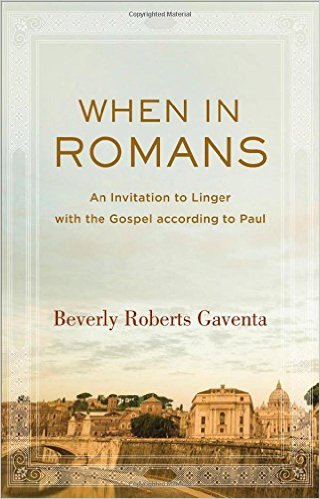One of the very best chapters in this book is Chapter 3, entitled ‘When in Romans, Give Glory to God.’ Here we have an essential and helpful discussion about the relationship between true worship and Christian ethics, the distaff of the discussion about the relationship between idolatry and immorality in Romans 1. I agree with Gaventa when she stresses that the right place to start discussing how Christians live and behave is by discussing a text like Rom. 12.1-2, discussing the issues of worship. She uses the interesting phrase ‘throw yourselves into the offering plate’ to indicate the gist of Rom. 12.1. Worship must not merely be whole-hearted, it must involve the whole self—all that we are and believe and do. While grace may be freely given, it is also utterly costly, it requires a total response. Here Gaventa echoes some of themes of John Barclay’s landmark book Paul and the Gift (reviewed at length earlier on this blog). Worship is a matter of returning to God what is God’s— ourselves. Withholding worship, by contrast, is the cause of distorted behaviors (p. 85).
Gaventa rightly goes on to emphasize that Paul is telling us here to focus on what we must do, and not on looking sidewise at what others are or are not doing. Paul does not favor critiquing others while ignoring our own failings. Her discussion of the strong and the weak in Rome (Rom. 14-15) is equally helpful and instructive. She is right that by the weak Paul means those Jewish Christians who have too many scruples about food and days of worship and the like. It is surprising however that she does not comment on what a radical about face this sort of discourse is for a former Pharisee who saw Jewish Christians as betrayers of the covenant. Gaventa is right that “if ethics is sustained and systematic reflection on moral conduct, then Paul does not have an ethic” (p. 93). Fortunately, this is much too limited a definition of what counts as ethics. As I have pointed out, we have neither theology or ethics in this or any other Pauline letter— we have theologizing and ethicizing into particular contexts, as Gaventa rightly recognizes. Paul the pastor is not offering us abstract tracts on theology or ethics, much less systematic ones. Gaventa’s focus on worship and doxology is absolutely right, and she is correct that in the context of true, lively worship our character is formed “and we are shaped to live accordingly.” (p. 95).
In the final full chapter ‘Welcome One Another’ Gaventa brings home some of the important implications of Paul’s use of body language for groups of believers, and even more the notion that God is the householder who orders the house, and we are but servants in the household of God, like slaves who have been adopted as sons and daughters into a family we do not have a birthright to belong to. She helpfully shows that the language about peace with God and with each other, has to do not with some inner tranquility per se but with the cessation of hostilities, the ceasing of our being enemies of God and one another. That is what the character of the body of Christ is supposed to be like. We are to use the gifts and graces God gives us to serve, not sever the body of Christ, and, in the process, serve God. There is also the helpful emphasis in this chapter that while there are boundaries to the Christian community, boundary keeping is not emphasized in Romans, rather the boundaries are meant to be somewhat porous so more of those outside can be welcomed inside. Yes, there are external and internal challenges to the community but “these challenges…prompt Paul to seek upbuilding but they do not prompt him to anxious monitoring of the community’s border” (p. 115). She is right that Rom. 12-13 speaks repeatedly about concern for the outsider, and not retaliating against them, but acting in love even towards one’s adversaries.
A surprise bonus of this book is Gaventa’s use of contemporary music to help bring home the importance of Paul’s discussion for the church today. Whether it is citing Bob Dylan’s ‘You Gotta Serve Somebody’ or the classic folk tune ‘Bound for Glory’ recorded by Woody Guthrie and many others, Gaventa shows her concern to help facilitate the use of Romans as a word on target for the church today. Most interesting is her contrasting of ‘Bound for Glory’ which excludes certain groups from getting on board (cf. ‘People Get Ready) to the all-inclusive anthem by Bruce Springsteen, ‘Land of Hopes and Dreams’ where any and all sinners and saints get on board the glory train. Gaventa makes clear that the universal ‘alls’ of Romans incline her to think that when Paul says all, all creation, all creatures, that Paul means God intends to save everyone and everything. It’s all about the divine initiative. And here, I must demur, because in important ways and in important places Paul disagrees with such a view, for instance in Romans 1.16-17 where he says salvation is for all those believing, and were Paul really a universalist, it is inexplicable why there is anguish over lost Israelites in Rom. 9.1-5 with his famous willingness to be ‘anathematized’ for their sake. The final recognition of Christ’s Lordship by all in Phil. 2.5-11 has to do with the fact that it will no longer be a matter of faith, but of sight. It will be obvious to all that Christ is Lord when he returns. Whether one embraces and affirms that lordship or not is another matter. As Mayfield (and Rod Stewart) sang in ‘People get Ready’ you need to both get on board and praise the Lord if you’re going to ride that train.














